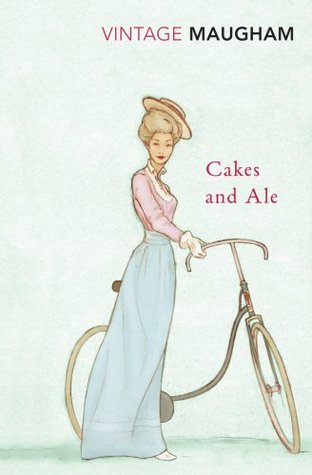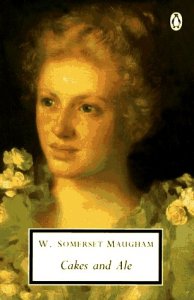 Having recently read five novels by Thomas Hardy in a row (A Laodicean, The Woodlanders, The Well-Beloved, Jude the Obscure, and The Return of the Native), and having heard from a few bloggers that Hardy is not their cup of tea, I turned to W. Somerset Maugham’s Cakes and Ale. Did I want cake? No. But Maugham’s brilliant novel revolves around a Thomas Hardy-like character, Edward Driffield. The narrator, Willie Ashenden, explores the perpetuation of myths about Edward Driffield after his death, and examines writers’ different approaches to shaping memories.
Having recently read five novels by Thomas Hardy in a row (A Laodicean, The Woodlanders, The Well-Beloved, Jude the Obscure, and The Return of the Native), and having heard from a few bloggers that Hardy is not their cup of tea, I turned to W. Somerset Maugham’s Cakes and Ale. Did I want cake? No. But Maugham’s brilliant novel revolves around a Thomas Hardy-like character, Edward Driffield. The narrator, Willie Ashenden, explores the perpetuation of myths about Edward Driffield after his death, and examines writers’ different approaches to shaping memories.
When Alroy Kear, a mediocre writer who has risen in the literary world through sheer obsequiousness, contacts Willie for the first time in 20 years, Willie cannot imagine what he wants. Roy is a user, and Willie’s waning career as a writer cannot make him useful. Although Willie says he still feels affection for Roy, his witty, satiric portrait of his character makes us think otherwise.
I had watched with admiration his rise in the world of letters. His career might well have served as a model for any young man entering upon the pursuit of literature. I could think of no one among my contemporaries who had achieved so considerable a position with so little talent. This, like the wise man’s daily dose of Bemax, might have gone into a heaped-up tablespoon…. I cannot but think that he saw the white light of revelation when first he read that Charles Dickens in an after-dinner speech had stated that genius was an infinite capacity for taking pains. He pondered the saying. If that was all, he must have told himself, he could be a genius like the rest…
And Roy does, of course, want to use Ashenden. He is writing a biography of Driffield, at the request of Driffield’s widow (Driffield’s second wife), an overly-refined former nurse, who wants to fashion their memories into an acceptable form.
 Although Willie was never a fan of Driffield’s novels, he very much liked Driffield and his first wife, Rosie, a former barmaid. He met the bohemian couple when he was a boy: Driffield kindly taught Willie to ride a bicycle, and they invited him frequently to tea. His uncle, a vicar, forbade him to see them, thinking them scandalously low-class, but even the curate clandestinely attended their tea parties, and eventually the vicar allowed him to do gravestone-rubbings with them at a historic cemeterys. One day, the Driffields left town without paying their bills, and Willie was shocked. But later, in London, he got to know them again. He especially liked Rosie, a very pretty, charming, smart, and kind woman, who went to bed with many of the guests.
Although Willie was never a fan of Driffield’s novels, he very much liked Driffield and his first wife, Rosie, a former barmaid. He met the bohemian couple when he was a boy: Driffield kindly taught Willie to ride a bicycle, and they invited him frequently to tea. His uncle, a vicar, forbade him to see them, thinking them scandalously low-class, but even the curate clandestinely attended their tea parties, and eventually the vicar allowed him to do gravestone-rubbings with them at a historic cemeterys. One day, the Driffields left town without paying their bills, and Willie was shocked. But later, in London, he got to know them again. He especially liked Rosie, a very pretty, charming, smart, and kind woman, who went to bed with many of the guests.
Driffield’s second wife wants to write Rosie out of the biography, or make her a villain. But Driffield wrote his best books when he was married to Rosie. And, eventually, Willie learns the tragic story behind Driffield’s Jude the Obscure-like novel, which kindled abuse from the critics. Rosie is a bit like Arabella, the barmaid in Jude the Obscure, but she is kinder and Willie humanizes the motivation behind her most shocking act.
I do love Maugham, and I wonder what his reputation is now. He reminds me slightly of Willa Cather, whom I read before her books were considered classics. Are any of Maugham’s well-plotted novels considered classics today, or are they “middlebrow” and “craftsmanlike,” as Cather’s were described? Both writers were gay, and sometimes they changed homosexual loves to heterosexual in their books. They wrote equally well about men and women, I think, though not all agree.
Fans of Hardy, as well as his critics, will enjoy Cakes and Ale.

Kat, I have an old red and blue British Penguin from 1965 on the floor by the side of my bed! I took it off the shelf weeks ago so I’d remember to read it soon. Thanks for reminding me.
LikeLike
And I want to reread Of Human Bondage. I loved it when I was a teenager.
LikeLike
I was thinking of rereading that, too. I very much enjoyed it.
On Tue, Sep 26, 2017 at 10:56 PM, mirabile dictu wrote:
>
LikeLike
Those old Penguins are so nice!
LikeLike
In the UK I would say that Maugham is a name that is known but very rarely read. He would be thought of as a crusty old so and so who wrote about irrelevancies. I’m not saying that I think that is true, simply that I think that that is how he would be preceived in many circles. And, I have to admit that I haven’t read anything by him. Is this the best place to start?
LikeLike
This book is so charming–it WOULD be a good place to start! Plus you would be amused by Maugham’s views of Hardy as literature, since you’re not a fan. I know nothing about Maugham’s life: all for the best, I gather.
On Wed, Sep 27, 2017 at 2:34 AM, mirabile dictu wrote:
>
LikeLike
Back in the 1980s, I read Of Human Bondage, The Razor’s Edge, and Cosmopolitans. I also have a two-volume set of all his short stories. I haven’t read him for ages, though.
LikeLike
I really got hooked when I read his short stories! Never heard of Cosmopolitans, but I will have to read more Maugham.
On Wed, Sep 27, 2017 at 7:23 AM, mirabile dictu wrote:
>
LikeLike
I have read some Maugham and enjoyed him very much, though I do have issues with him as a person! 🙂 This is one, however, which I own and haven’t yet picked up but it sounds rather good!
LikeLike
It’s SO entertaining! I know *nothing *about his life, so have no issues with him.
On Wed, Sep 27, 2017 at 8:38 AM, mirabile dictu wrote:
>
LikeLiked by 1 person
I haven’t read Maugham in quite a while, but I always enjoyed him. Thanks for the reminder, I need to read something by him soon.
LikeLike
His books are so enjoyable!
On Wed, Sep 27, 2017 at 9:44 AM, mirabile dictu wrote:
>
LikeLike